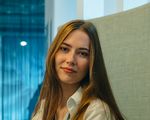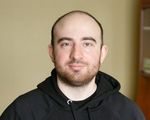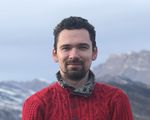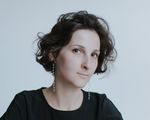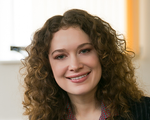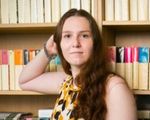About the project «Success Builder»
How do you find your place in life? How do you find something to do that both comes naturally to you and makes you happy? The answer is that you have to apply the knowledge you’ve gained from university and from life itself correctly. The Success Builder Project features graduates from the Higher School of Economics who have discovered themselves through an interesting business or an unexpected profession. The protagonists share their experiences, and talk about the big shots they’ve schmoozed and how they’ve made the most of the opportunities they were given.
Large companies increasingly value soft skills, the ability to communicate and think ‘outside the box’ — and every top manager must have this ability. Segezha Group sales director and ICEF graduate Peter Kabin explained how to monetize soft skills and build a successful career even if you were not the best in your class.
How did you choose a university?
I am a typical student — though not the best in my class — whose parents made that choice for me. You can divide ICEF students into two groups. The first are those accustomed to ranking near the top and who came here as academic achievers destined to succeed. The second includes students like me who are in the lower half of their class rankings. This means that ICEF is good not only for the super-smart — although, of course, many such students do also choose ICEF, and I am proud of my alma mater for this. But there are others whose paths are bumpier and who have to cope with failure at times. I won’t hide the fact that I had to repeat my second year of studies. But this only made me stronger.
I was initially planning to apply to Moscow State University, but I was also considering HSE University. In the end, it was a subjective factor that tipped the scale: the atmosphere or, as it is fashionable to call it now, the ‘corporate culture’ at HSE. The ICEF is unique in that it is international in scope and enables students to communicate at a new level, take a broader view of the world and understand the connections between things. What’s more, ICEF is a brand that gives you a competitive edge when applying for a job. However, like many young people at that age, I was not quite ready to jump into adult life and take on a new world view. I first underwent a kind of intense socialization. I began to actively participate in university life, and particularly in the student council, and I did well there. On the other hand, it was difficult for me to focus on concrete academic tasks. There was the feeling that I had to move very quickly because tests and courses didn’t give me a chance to relax, but I didn’t know what I had to do exactly and didn’t understand the value of studying.
Who do you think could have explained to you, as a young man, the value of studying?
I am really glad that HSE has instituted a mentoring program: we didn’t have that when I was a student. I often speak to young people at the ICEF Evening School and explain the importance of studying at the university. I would like to instill a hint of awareness in advance so that they do not repeat my mistakes. And the story of what I did wrong is as follows.
After the second year, I didn’t pass one of my University of London exams in economics. That was a turning point: should I drop out or remain as one of the ‘bad’ students?
I stayed. For an ambitious resident of the ICEF programme, this decision was a painful test of pride — it’s not so pleasant to be a ‘bad’ student. Starting with my third year, I began working full-steam, taking advantage of my internship at Sibur to stand out in class. From that moment on, I understood the purpose behind what they teach at the university — and most importantly, how you can monetize knowledge. And the knowledge you gain at ICEF is useful for everyone, and not only the top students.
I am 25 years old and hold the position of Sales Director at Segazha Group. It might sound like I’m bragging, but approximately 60%-70% of the company’s profits depend on my efforts. This is a serious responsibility that is usually given to someone closer to 40. My boldness and willingness to take on challenges is largely due to ICEF. It was there that I learned not to panic, to plough forward and find some magical way to, for example, take six exams in just 10 days.
It seems that failing your London University exams ended up helping you, whereas someone else in the same situation might have given up. How do you turn stumbling blocks into stepping stones?
It’s very easy to feel that you’re not living up to someone’s expectations and to lose faith in yourself. You find yourself at ICEF and you’re not the best in your class or a hard worker. You’re not just screwing around, but you’re not meeting a given standard either. You could call it quits, take whatever job comes along, conclude that you’re a loser, and so on. It’s difficult not to just follow the same path everyone else does, but when you're just starting, there are countless different directions you can take. An ICEF graduate works in my department now. Together we opened a space near the HSE campus on Pokrovsky Boulevard where students can prepare for exams, case studies and joint projects.
Do you still consider yourself a ‘loser’?
No — I’m more the type you wouldn’t call ‘amazingly gifted’ or a ‘genius.’ Not everyone is destined to become an outstanding McKinsey consultant, although most ICEF graduates are like this. The world is a big place. You just need to shift your focus and you’ll see how many opportunities are available to someone who simply has a good education, and Russia is unique for the number of opportunities it offers. At Sibur, I worked first with the polymer industry and now, as I jokingly say, I have switched from the dark side to the light side — to the lumber industry. This field is growing like crazy and there is a shortage of personnel: specialized institutes are not graduating the necessary managers. What is the field of sales? It is not so much a specific education as it is a way of life, the search for the optimal solution for all interested parties to the transaction and negotiations. For example, when studying at ICEF, you must score well on your exams or else the value of the institution — and with it, the weight of your diploma — will decrease.
Good grades and knowledge are not the only things that will help you build a career in a company: sound logic and honesty are also important, and I respect ICEF for educating honest students. Even when we didn’t know the answers to something, it never even crossed our minds to copy from someone else.
Honesty is in high demand on the labour market right now
Teamwork skills also help me a lot, and as students, we worked together on case studies. International companies perform best with horizontal management structures — without formal hierarchies between directors and subordinates. Working on projects as a team is the most popular form of interaction.
But economists are not taught the liberal arts. How do students develop flexibility, critical thinking skills and the ability to think outside the box?
Learning social skills is like playing chess: each piece can perform a certain number of moves and the main thing is to figure out the best moves given the arsenal at your disposal. My job involves communicating with the top managers of various companies. These are people with a global vision of processes, who set strategic goals and an understanding of how everything works. This is my main school. Students need to also take the opportunity to speak with such people — and there are many such instructors and guest lecturers at HSE University.
Flexibility comes from the process of communication and awareness, including knowing your weaknesses. I do things right not because I’m perfect, but because I have a certain amount of experience. It was only at Sibur that I began to understand how my university knowledge applied to the real world. One of the main objectives of the HSE curriculum is to learn to apply different options and be flexible in finding solutions. The world is not black and white but has numerous important halftones. Knowing this is very important when working with representatives of different cultures in an international company.
Did you often encounter different cultures at Sibur, and do you in your current job at the Segezha Group?
I visited 20 countries this year. You find yourself in a world of completely different values — different religions and different social backgrounds. In such situations, only a universal understanding of what is happening enables you to make contact with others. However different we might be, there is always some common ground. I adapt to the new settings, and this reminds me of when I took my international exams: certain constants remain unchanged, regardless of the particular value system.
After graduating from ICEF, you chose not to become a consultant. That is already strange. And, you are building a career in a Russian company — which is doubly strange. Why?
I think the McKinsey brand will be a meme in our interview. After all, ICEF graduates often say, ‘Why would I go to work for another company if I can work at McKinsey?’ It’s just that I found what works best for me and didn’t follow the standard ‘path to success for HSE graduates.’ I am grateful to my father who made decisions for me during a particular period. Just reasoning things out is not enough in life: you need to go out and try and make mistakes. Once you’ve finished your studies, you have to go get experience and learn through the school of hard knocks what fits and what doesn’t. While a student, I found internships for myself every summer. After my first year, I did an internship with the Finance Ministry. It turned out that that wasn’t for me. Next, I worked in a bank. That didn’t feel right, either.
I began to understand what my strengths were and what I needed to arm myself with in my job search, other than education. I have strong communication skills and my father has friends in a wide range of companies. Networking helped a lot: someone suggested I try my hand at commerce, with the result that I was offered an internship at Sibur. I went to work there and found myself in an entirely new world. One of my first mentors at Sibur remains a friend, guide and mentor, and we are building our careers at the same time, overcoming new challenges.
Sibur is a driving force of the economy, a huge international company with its decision-making centre in Russia. I began working with people who instilled in me a sense of responsibility towards studies, work and family. I gained practical experience and matured. In four and a half years, I went from an intern to the deputy director of the department responsible for the sale of raw materials for plastic bottles. I worked on joint projects with such giants as Pepsi and Coca-Cola, took on huge responsibilities, and then witnessed the results of my decisions. I made some mistakes, but I always learned from them. The most important thing I learned was that you should not simply look for a company to work in, but for the right people to work with.
But don’t most people prefer working for McKinsey?
People are afraid to go beyond the stereotypes. It doesn’t matter which product you deal with, whether you sell paper, plastic, telephones, beverages or give advice.
All success comes down to communication and the right use of social capital
In speaking with ICEF students and graduates, I have come to understand how the labour market underestimates them. Yes, the ICEF brand is well known among the top consulting firms but almost unknown beyond that circle. There is a certain one-sided perception of an international education in economics, although ICEF graduates are valuable specialists in almost any field.
Why did you move to the Segezha Group when it seems you were happy at Sibur? What new opportunities did you find?
Although there is a generally accepted, linear and step-by-step growth in one’s profession, my growth was exponential simply because it was possible. I set myself the goal of constantly developing. There was an opportunity to move to the Segezha Group with just such a significant increase in position, functions and expertise. Whereas Sibur is already an extremely successful and stable structure, the Segezha Group is in an extensive growth phase. This is a different experience, a chance to understand and test myself under new conditions. Here, I pay a different price for mistakes and the processes and ways to present myself are different. And yes, it involves risk.
This is exactly what ICEF students learn when coping with double exams — not to be afraid
Sometimes a student has a vital need for advice about work experience or an internship and he wonders: ‘Should I write to an HSE graduate through Facebook or some other social media? Should I stop a professor after a seminar and ask my burning question?’ The answer is, yes, he should definitely write that note or stop and ask that professor! That’s how it should always be. The more often you overcome these barriers to communication, the further and faster you will progress in your studies and life. Everyone — from an instructor to a student to a super-successful businessperson — is just an ordinary person. Believe me, they all experience failure and periods when they lose faith in themselves.
How can students develop their communication skills?
The ICEF programme had an elective on the Myers-Briggs Type Indicator (MBTI). This was a breakthrough for me. Of course, corporate finance and economics classes are a ‘must-have,’ but effective communication skills are also necessary. Without them, it’s like trying to learn to read without knowing the alphabet. When I discovered the method for understanding and ‘classifying’ people, I began to see their strong and weak sides. I began to understand how to approach them and, strangely enough, how to get a handle on the profession itself. Absolutely everyone needs effective communication skills — including to get that dream job.
Ecological considerations now strongly influence business processes and industry in general. The trend towards eco-activism and increased awareness among citizens is forcing large industrial companies to rethink their rules and attitudes. Do you feel this at the Segezha Group?
Ecological considerations are extremely relevant and they are transforming the whole industry. Major brands such as Coca-Cola and PepsiCo are reorganizing in response to market conditions and ethical agendas. Starbucks is testing blockchain so that consumers will know where their coffee came from and that no child labour was used in producing it. Ford offers a ‘biography’ of its Cobalt car to show that it does not violate owners’ values — and this type of thing is happening everywhere.
If I wanted to depict the stages of my life in pictures, I would get tattoos of a Pepsi bottle and a roll of Segezha paper. In Europe, they recycle 40%-60% of all plastic bottles: you tear off the label, grind it up and the granules are then ready for the production of new bottles. It is very environmentally friendly! Everything depends on the quality of the implementation. Plastic bottles are far more ecological than glass, which requires much greater resources to recycle. The subject of ecology and environmental awareness is changing the world. I currently work in timber processing and am responsible for packaging, and so I see the situation from the standpoint of both the consumer and the producer.
Mankind has always built its economic relations on the ‘gifts of nature’ because the cost of nature is ‘zero.’ On the one hand, people are now focusing on the ‘ethics of beauty,’ and on the other hand, we are afraid that natural resources might eventually run out. Unlike oil, timber is a renewable resource, and planned logging is a part of the recycling process. Paper is not a key industry in Russia, although for decades the West has taken a scientific approach to planned logging and reforestation and they have a high level of social responsibility towards resources. One example is the leader of the European paper industry — Sweden — where they make films about utilizing timber resources effectively and in an environmentally friendly way. Even the economic model itself is called ‘Swedish.’ Society carries the primary responsibility for setting environmental trends. The beaches in the UK have become noticeably cleaner after they introduced a tax on the use of plastic bags. In Russia, the Eldorado and M. Video companies have completely stopped using plastic bags.
Why are people willing to pay more to protect the environment?
Environmental concerns are unprofitable, and large companies always base their actions on the bottom line. But people have started to change: they have become more aware, and that awareness has changed undergone a reversal since the end of the 20th century. It became clear that until you recycle your plastic and start putting your purchases in a cloth bag, nothing will change at the government level either. This has led to a paradox: people are willing to pay more if they know they won’t be destroying a tree by taking three paper cups — although they could pour their coffee in their own eco-mug. People feel that they are involved in something important and, truthfully, this has also been monetized heavily.
This monetization of ethics is a phenomenon of the modern economy. It isn’t possible to calculate this exactly, but the fact that we are prepared to pay more for a paper bag or that we prefer products with green leaves on the packaging proves that the consumer culture society has changed greatly. To build a company’s development strategy on the global market, it is first necessary to establish communication with various social groups, to study and accommodate their values.
You have visited many different parts of the world. How are the attitudes of the global community towards environmental issues changing?
When I was in El Salvador — that is considered the world’s most dangerous country — I saw almost no plastic bags: all of the trash bags were made of paper. In Guatemala, people drink only from paper cups. I was surprised by Pakistan: plastic bags are prohibited there, despite the country’s low ‘rating.’ In this way, I gather data and form an appropriate agenda for myself and the company as a whole.
Travelling and gathering such social and cultural data teaches you tolerance, awareness, and ways to resolve any conflict — including environmental issues — diplomatically. But to be a part of this modern outlook, you need to have some sort of foundation — that is, a good international education. Without that foundation, you are shut off from the world: the old automatic approach of ‘I came, I saw, I conquered’ doesn’t work in post-industrial society. You need to be forward-looking and influence social processes because the individual is the main value now at every level.



